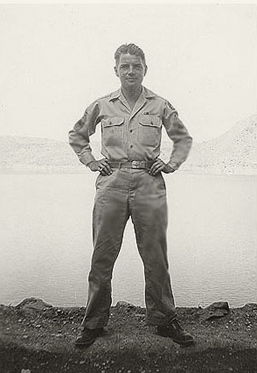MSgt. Phil Ingraham’s War Stories— Introduction
Leon Trotsky is said to have said, “You may not be interested in war, but war is interested in you.”1 It seems that war has shown an undue interest in my family (which, of course, is the experience of most families on our benighted planet):
• Jonathan Ingraham, one of my great-grandfathers, fought the British in the American Revolution. He was a mercenary, paid by a wealthy “gentleman” to take his place.
• David Ingraham, my great-grandfather, was a Union soldier who was wounded at Antietam in the American Civil War.
• David Lusty, a distant cousin, served in the 5th U.S. Infantry during the Philippine-American War, otherwise known as the Philippine Insurrection, one of America’s many early military misadventures. He contracted tuberculosis and was hospitalized in the army’s sanitarium at Fort Bayard, New Mexico, where he died on May 13, 1902.
• Robert L. Ingraham, my grandfather, was a member of a New York State National Guard unit that was nationalized in 1916 — along with all National Guard units in the United States — and sent to the US-Mexican border at Pharr, Texas in support of General John J. Pershing’s “Punitive Expedition” against tmet he Mexican bandit Pancho Villa. A Villa force had attacked a U.S. Army garrison at Columbus, New Mexico, on March 19, 1916.
• My Uncle Phil — MSgt. Philip Ingraham — served in the U.S. Army Air Forces in the South Pacific during the Second World War.
• In 1966, I found myself fighting for my life in South Vietnam, where I served as a hospital corpsman with the 3rd Battalion, 1st Marine Regiment — 3/1. In Vietnam I learned first-hand what a modern military rifle can do to a human body — my human body! Specifically, my right thigh. Almost 20 years later, I began to realize that some of my insomnia and occasional angry outbursts were rooted in my experiences in Vietnam. Several years later I was diagnosed with combat-related Post-Traumatic Stress Syndrome.
Little of the experiences of Jonathan Ingraham, David Ingraham, David Lusty, and Grandpa Ingraham can easily be documented. In other web pages, grouped under the general heading 37 Days in Vietnam, I write about my own combat experiences. This web page fully explores MSgt. Philip Ingraham’s adventures.
MSgt. Philip Ingraham (December 11, 1916 - March 23, 2012)
I first became acquainted with my Uncle Phil — Master Sergeant Philip Ingraham for the purposes of this narrative — in late 1945, when I was only three years old. He was a recently returned veteran of the Second World War; he had spent most of the war in the South Pacific, where he was one of a unit of radio repairmen who maintained the complex web of communications equipment used by the U.S. Army Air Forces.
Uncle Phil was the perfect uncle — friendly, generous, and funny, and the owner of wonderful toys: he was a ham radio operator, and I clearly remember his call sign — “W2 OSY,” with “OSY” spoken phonetically as “Ocean Sugar Yesterday”. He also used the phonetic “Old Sleepy Yokel,” but I don’t recall that. In conversations with my aunt, I learned that before the war his call sign had been “W8 MRA” — “Mice, Rats & Applesauce”.

I never knew much about Phil’s wartime experiences. Indeed, I was never particularly curious about them: they had nothing to do with me; the young think of little except themselves.
In recent years, however, I have become more curious about the Second World War, and about the role that my family played in it. My father had tried to enlist at the beginning of the war, but his asthma disqualified him, so my parents’ memories were only of the war at home.
In 1998, at my request, Uncle Phil recorded his memories on tape and sent the resulting cassettes to me, along with a few photographs and other artifacts from the war years. They form the nucleus of the following narrative.
Phil Ingraham grew up and came of age in small communities in Western New York State, surrounded by hills and valleys and other small communities; his military training and service took him back and forth across America and then halfway around the world. It was a broadening experience for a young man who until then had lived an insular and safe life.
From January, 1942 until the summer of 1945, almost everything Phil did was focussed on the greatest imperative of the 20th Century, the destruction of the Axis. He saw life at its best, and worst. He learned how young soldiers can die suddenly, and horribly; how they can suffer not even a scratch, but their minds can be shattered. Phil survived Japanese bombs, close encounters with Japanese fighters, and a night flight in an unarmed B-25 bomber during which the air crew became lost over enemy waters.
In short, between 1942 and 1945, he became a member of the elite brotherhood of men from all countries and all periods of history, who have marched into harm’s way and come home from their experiences as changed men, often better men.
MSgt. Philip Ingraham died early in the morning of March 23, 2012, at Founders Pavilion long-term nursing care facility in Painted Post, where he had been a resident for 15 months, truly suffering from multiple age-related conditions.
Bob Ingraham
Vancouver, British Columbia
-
Although Trotsky is normally given credit for this quote, it seems to be a revision of an earlier statement by Trotsky, "You may not be interested in the dialectic, but the dialectic is interested in you,” translated in Night Soldiers: A Novel by Alan Furst, published in 1988. Only a loose translation "the dialectic" could restate it as "war." ↩︎